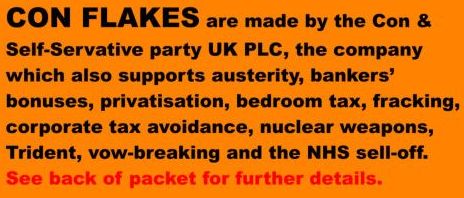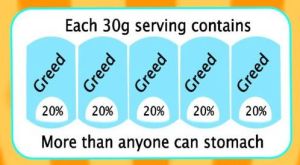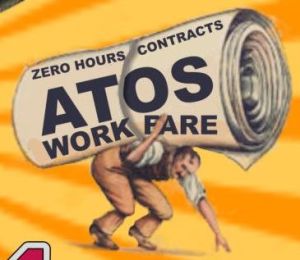| What’s on this page? | |
|
To the right is the full Con Flakes packet. Click on the image to see it larger. Below you will find explanations of all its components. To make your own, please visit Con Flakes box to print out and assemble. |
|
| Why cereal packets? | |
|
Apart from being a response to the notorious patronising BT lady’s enjoinder not to get informed about politics, but simply to ‘eat your cereal’, we are using cereal packets for this project as they are ubiquitous consumer objects, brightly decorated and individually distinctive but in reality all containing fairly similar products, just as the mainstream political parties pretend to be different but all peddle neoliberalism, which you might also call ‘free-market’ capitalism or hypercapitalism. (If you get nothing else from this site, please at least learn about the cardinal features of neoliberalism, the destructive ideology threatening communities and ecosystems across the planet.) Consumer choice? We loathe the phrase ‘consumer choice’. Both in terms of political parties and in terms of material goods, we are offered an apparently wide choice. This is a con (see below for more on cons) as the choice is superficial. There is no meaningful choice (or the worthwhile and meaningful options – i.e. not to participate in the destructive charade – are obscured or made difficult), and many of us waste our valuable time weighing up trivial options. Aware and empowered global citizens, we do not want to waste our lives agonising over what school to send our children to, what healthcare service to use, which power company to get our energy from, or which rail or postal service to use (what company’s shareholders and CEO to enrich). We demand good public services, owned by us and run for the common good. The cereal packets are a metaphor for the distraction and infantilisation of people by consumerism and materialism, nicely illustrated by this humorous video. Conspicuous consumption 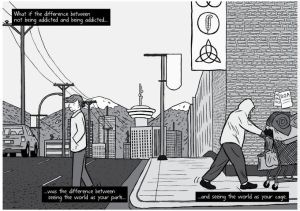 Bruce K. Alexander’s famous rat park experiment laid the groundwork for his comprehensive book on the causes of addiction, ‘The Globalisation of Addiction’. Click on the image to learn about the experiment. Canadian psychologist Bruce K. Alexander argues that many of us are suffering from what he calls ‘psychosocial dislocation’ as a result of the economic system, and that this makes us vulnerable to harmful addictions, not least the endless, unfulfilling and environmentally unsound quest for material goods. This is also related to status anxiety and competitive or conspicuous consumption. How many people, for example, buy Kellogg’s cornflakes rather than supermarket own-brand cornflakes because they are conscious of what others think rather than because of the real relative merits of the cereals? The effects of this sort of thing in children are particularly worrying. Convenience and conversation A final reason for using cereal packets is that they are conveniently sized three-dimensional objects which can be passed around and used to inform people and stimulate conversation and debate. Please consider printing them out and using them in this way! |
|
| Explanation of the front of the box. | |
|
Why Selloffs’ Con Flakes? Con refers both to the Conservative and Unionist Party, to give it its full name, and to the fact that many of their policies amount to cons – confidence tricks or swindles. One of these cons has already been explained above. Sell-offs (of public entities to the private sector) are just one example of the cons perpetrated by the Conservative Party. These are explained in more detail below, While the Conservative Party’s policies are given a superficially rational explanation (exemplified by the phrase ‘trickle-down economics‘, often paired with the inappropriate metaphor ‘a rising tide lifts all boats‘), which is dutifully relayed by the BBC and other neoliberal media (see Media Lens for a critique of these media), in reality the policies are ideological and the rationale flawed. Conspiracy? Whether the proponents of these ideas actually believe the rationale, in the face of overwhelming evidence that the policies don’t ‘lift all boats’ (see, for example, Ha-Joon Chang’s 23 Things They Don’t Tell You About Capitalism), or whether they merely pretend to believe it, in order to justify them, knowing full well that they only serve to enrich themselves and their super-rich pals, is open to debate. Probably some ideologues actually believe in them (or don’t want to examine them too deeply as they benefit from them) while others are fully in the know and deliberately conning others. Whatever the case, conspiracy or not, the fact remains that their policies do amount to a con, and that is why we labelled this packet ‘Con Flakes’. Examples of cons: austerity, sell-offs and creeping privatisation Many cons have been perpetrated by the Conservatives and the other neoliberal parties. Here are just three examples. This policy, of savage cuts to public services hitting the poorest the hardest, has seen the deficit fail to drop as predicted. Public borrowing (debt) has gone up, and (weak) economic growth has been based on increased private debt too, because wages have remained low and new jobs have been of poor quality (such as those involving zero-hours contracts), thus harming tax revenues. The UK was already one of the most unequal countries in the developed world (see the section below on the top and bottom of the packet), and austerity has only made things worse, Anyone with any degree of economic sense could foresee that it would work this way. In fact, austerity is a con used as an excuse for the ideologically motivated dismantling of the welfare state. One author describes it as The Great Neoliberal Lie. Here is how we can frame the story and fight back. (2) Sell-offs Sell-offs are one example of how public goods are put into private hands. A recent example was the privatisation of the Royal Mail, which was floated at a ridiculously low share price, ensuring extremely bad value for the taxpayer and vast profits for super-rich cronies of the ruling party (hedge funds, bankers…) who snapped the shares up and could then sell them once their values had skyrocketed. You may be sure that working conditions for those employed by the Royal Mail will suffer, as will the universal service offered by it. All will be sacrificed for the sake of shareholder profit. (3) Creeping privatisation Creeping or patchwork privatisation is what is happening to the health service (NHS) in England and Wales. The beneficiaries include many Tory (Conservative) and Labour peers, MPs and former MPs, who have interests in the companies that will benefit. Here is another list of beneficiaries. Now Wall Street threatens to take more of it, thanks to TTIP, which is discussed below. The drive for profits results in worse care for patients in various ways. |
|
| The military element | |
| The UK is one of the world’s largest arms manufacturers. Rather than work to replace this industry with more benign ones, successive UK governments have pushed the filthy business, even employing the Royal Family to tout these lethal wares to dubious regimes. British Aerospace (BAe) is a notoriously corrupt company. War is ‘good’ business, if all you care about is the profits of the super-rich, (as was pointed out a long time ago by Major General Smedley Butler) so there is every incentive to encourage it. It’s hard to see how UK-US military interventions, which inevitably kill civilians, do more than foster reciprocal acts of terrorism, and help the arms business, and the vicious but profitable circle continues…
Why the reference to Pablo Picasso’s famous Guernica painting? It was painted in response to the Nazis’ devastating casual bombing practice on the Basque town of Guernica during the Spanish Civil War. Similarly, successive UK governments have meted out death to civilians, directly and indirectly, often alongside their US allies, and often through their support for brutal and oppressive regimes. Here are just a few examples:
Let’s be blunt about this: under the main UK political parties, the UK has long been a terrorist state, alongside its partner in crime, the USA. It will remain so as long as we vote for any of the main UK political parties (and we include UKIP in these). |
|
| Israel | |
One of the most hideous facets of the Conservative Party and the other mainstream UK parties is their unstinting support for Israel, illustrated by these organisations:
They all perpetuate most of these myths. (Note, as a good example of them, Hamas’s supposed use of civilians as shields. The evidence shows it is Israel that does this.) Rather than go on at length about the atrocities committed by Israel with the tacit or blatant backing of the UK government and most of the mainstream media, including The Guardian, we refer you to the following:
As a final remark concerning Israel, note that Sainsbury’s supports both Israel and the Conservative Party. |
|
| It’s not only weapons that kill. | |
 Setting aside the arms industry, UK government-backed ‘investments’ kill people the world over in a variety of ways. Apart from killing people through military means or through supporting others’ military actions, the UK government also kills people through its support for the piratical actions of multinational corporations. For example, the UK is currently lining up to support massive land-grabs in Africa, a phenomenon which can only have devastating consequences for the people who will be displaced and the environment. We suggest you might also like to investigate transfer-pricing, which deprives the poorest countries in the world of vital revenue for healthcare etc., indirectly killing many thousands of people every year. You will understand why the UK government is reluctant to do anything about it: its major donors and media allies such as Rupert Murdoch exploit this and other means of avoiding tax to the hilt. |
|
| Support for the Conservative Party’s policies by others | |
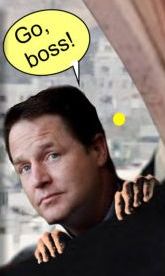 Nick Clegg, leader of the Liberal Democrats, plays a key role in keeping the Conservative Party (‘Tories’) in power through participating in a coalition with them. Without the support of the Liberal Democrats, the Conservative Party (also known as the ‘Tory Party’) would not be in power, so they must share responsibility for everything the Tories do. Because they have effectively merged with the Tories and because they will probably be wiped out at the next elections, they do not merit a cereal packet of their own. This photograph of Nick Clegg, their leader, is our only reference to the Liberal DemocRATS, apart from his appearance alongside his Tory cronies on the top of the packet. He is (as I am sure you have guessed), the privately educated son of a banker.  ‘Clegg’ is the Scottish word for the horse-fly, a pest that delivers a painful bite and transmits diseases and parasites. Incidentally, ‘clegg’ is the Scottish term for horse-fly, members of the Tabanidae family. They deliver a painful bite and transmit diseases and parasites. One could argue that the over-consuming and tax-avoiding super-rich, championed by the Tories with the help of the Lib Dems, are also parasites, so Nick Clegg’s surname is apt. |
|
 Ed Miliband, Leader of the so-called Labour Party, champions policies that are scarcely different from the Tories’. Supposedly in opposition to the Tories, the Labour Party, led by Ed Miliband, has policies that barely differ from theirs. We consider that both Ed Miliband and the Labour Party have betrayed their origins. This is explained in the text relating to the Sellouts’ Faker Oats packet. |
|
 Nigel Farage, son of a stockbroker and former commodities trader on the London Stock Exchange, is the leader of immigrant-bashing UKIP. Nigel Farage, privately educated son of a stockbroker, is a former commodities trader on the London Stock Exchange and the leader of immigrant-bashing UKIP. He loves to present himself as representative of the common man but is adept at diverting attention from the super-rich pirates at the top of the UK pile (such as bankers, commodities traders and stockbrokers) and scapegoating those at the bottom. Please see the Hellogg’s Special uKip packet to learn more about this obnoxious champion of rampant, pillaging, ‘free-market’ capitalism. |
|
| The Conservative Party summed up | |
|
This summarises what the Conservative Party stands for. Most of the cabinet are millionaires, and several have shady histories of tax-avoidance. Privatisation, corporate tax-avoidance, the NHS and austerity have been mentioned above. (Note especially their business interests in private healthcare companies). Fracking is discussed below, with reference to the back of this cereal packet, as is vow-breaking, but for now just note the links between the financial sector, MPs and the fossil fuels industry. The Chancellor, George Osborne, defends bankers’ bonuses. It is these same bankers who caused the latest economic collapse. (See what Ian Fraser has to say on the topic of performance-related pay, and see what David Erdal says about executive pay in general. Their views are echoed by Ha-Joon Chang in his book 23 Things They Don’t Tell You About Capitalism, which we highly recommend.) Nuclear weapons, with Trident as an example of them, can never be used and cost a fortune. They are merely a way of transferring public money into private hands, bring with them the risk of accidents, and do nothing to deter terrorists (indeed, they present a target). Furthermore, Trident is not good for employment. The Scottish Parliament has voted against the UK basing Trident in Scotland (at the Faslane base near Glasgow, Scotland’s most populous city), but this cuts no ice with Westminster. You are referred to the website of the Scottish CND for further information. |
|
| Explanation of the left side of the box. | |
|
Bank CEOs earn over £750,000 per day! The median pay of bank CEOs in 2012 was ‘$552 million, up from $452 million in 2011, and included salary, bonus, perks, the potential value of stock and option awards and other elements‘. That means that 50% of bank CEOs received more than this. This would amount to approximately £286 million pounds/year, or well over £750,000/day. See the links in the section above to judge whether they are worth it. An average registered nurse in the UK earns £23,000/year, or £63/day. A nurse could work for a thousand years and still fail to earn what a bank CEO earns in one year. The national minimum wage in the UK is £6.50. If you worked a 35-hour week for 52 weeks of the year you would earn £11,375, which is £227.50/week or £32.50/day. With rent costing hundreds of pounds a month, no wonder so many working people are on benefits! And remember that with the dearth of social housing in the UK much of housing benefit goes straight into the pockets of private landlords – they are the ones profiteering from benefits. Here’s a general myth-buster with regard to benefits claimants. Currently the Jobseeker’s Allowance (JSA) is a maximum of £72.40 a week. If you assume housing benefit of, say, £90/week (it was £87 in 2012), then benefits’ claimants with no other sources of income must pay for practically everything (except council tax) on £8,445/year. They have £23.13 to survive on each day, for rent, food, gas, electricity, transport, etc. Tax-avoidance by the super-rich is estimated to cost the UK £69.9 billion/year. Assuming a population of 64 million, this amounts to over £1,000 for every man, woman and child in the country. Here’s a very short but instructive YouTube video on wealth inequality in the UK. It shows that most people have no idea about just how unequal a society it is. To understand the effects of this inequality see the section on the top and bottom of this packet, below. If you are worried about unfairness in the UK, your focus should be on doing something about the gross abuses at the top of the tree. Patronising BT Lady, however, pictured at the bottom, does not want you to discuss politics, which means issues such as this one. ‘Eat your cereal!’ |
|
| Explanation of the right side of the box. | |
|
Q1. What is WONGA? Wonga is one of several payday loan companies. They profiteer from the poor, charging very high rates of interest. Wonga was fined for threatening late-paying customers with letters from law firms that didn’t exist. The Chancellor, George Osborne, has been likened to Wonga here because his policies also hit the poorest in society and benefit the rich. This is also a humorous reference to Willy Wonka, a character in Roald Dahl’s Charlie and the Chocolate Factory. Q2. What does TTIP [often pronounced tee-tip] mean? As the World Development Movement/Global Justice Now says: The Transatlantic Trade & Investment Partnership (or TTIP for short) is a so-called ‘free trade’ deal being negotiated by the EU and US. The deal will give big business more power over our society, environment, public services, and democracy. Shamefully, the UK government is a major supporter of this deal, which would tighten the grip of big business over our society. TTIP could:
But we can defeat this deal. Take action at www.wdm.org.uk/ttip. (Note that we should have written that TTIP will oblige governments to hand over power to multinational corporations.) Q3. What is Quantitative Easing? Quantitative Easing (QE), practised by UK Chancellor George Osborne, is when central banks create money by buying securities, such as government bonds, from banks, with electronic cash that did not exist before. The new money swells the size of bank reserves in the economy by the quantity of assets purchased—hence ‘quantitative’ easing. Professor Richard Werner, who invented QE, says: ‘In both Japan and the UK, QE isn’t working, because it doesn’t focus on “the most important part of the money supply”, which is bank lending. “UK QE has singularly failed, as bank credit is still shrinking.”‘ This practice does not solve underlying problems, and some believe that it sparks global unrest. Here is another good explanation of QE. Note especially: ‘As with all economic policies, there are winners and losers. The Bank of England’s own research estimates that QE has disproportionately benefited the wealthiest 5% of British households, with over 40% of the economic benefits of QE going to them. The fact that the extremely wealthy are the main beneficiaries of QE is extremely concerning, since the richest 5% are also by far the most likely to avoid paying tax on their gains by funnelling them through elaborate tax-dodging scams, meaning that much of this newly created money has already been siphoned directly out of the UK economy into tax havens such as the Cayman Islands or Liechtenstein.’ Nice one, George! Q4. Where do loans come from? The astounding truth is that commercial banks are allowed to conjure the money they lend you from thin air. They can type numbers into a computer and create electronic money in your account. Then they charge you interest on it and award themselves bonuses on the basis of how much money-as-debt they have created. They do not have the money they lend you in the first place! Most money in circulation has been created this way, which means there is more debt than money in the world. This process creates huge inflationary bubbles (such as that associated with property) which must burst at some point. In other words, it inevitably causes financial instability while it redistributes wealth from the poorest to the richest. This is crookery and madness on an epic scale, and must change! If you don’t believe us, please spend a few minutes on the Positive Money website. Q5. How can you halve a debt? This is a humorous reference to David Cameron and George Osborne’s posturing over £1.7 billion that the UK owed the EU. Osborne claimed to have had the debt halved, but critics say he only achieved the supposed reduction by bringing forward a rebate to which the UK would have been entitled anyway. The third answer is correct. Here are some campaigns against the bedroom tax. You may wish to sign this petition. Q7. What did ATOS Healthcare do? Atos did all three of these things. Nearly half those with progressive diseases like Parkinson’s were told they would recover. Here’s a typical story. Q8. What is Legal Aid? All three of these. Here are Liberty’s ten reasons for opposing cuts to Legal Aid. Here is what is now happening as a consequence of the cuts to Legal Aid. P.S. Please don’t Google the answers, Ecosia them! |
|
| Explanation of the back of the box. | |
|
To the left you will see the whole of the back of packet. You may click on the image to see it larger. Many of the elements have already been explained, so where this is the case we shall simply refer you to our explanations above. Those that haven’t been explained yet are discussed below. |
|
| Greed | |
|
OK, we’re just having a bit of fun here. ‘Greed’ is a facile explanation for the ruthless, predatory behaviour of those at the top of the tree. Arguably, many of them suffer from what Bruce K. Alexander calls psychosocial dislocation, having been, for example, shipped off to boarding school at a young age. Consequently, they find themselves addicted to the pursuit of wealth and status (not to mention alcohol, cocaine, etc., but because they can afford these addictions they often fail to be noticed or condemned by society). Nick Duffell, who refers to an excellent piece by Vicky Allan in the Sunday Herald, says: ‘Once you see it, Cameron, like Blair before him and Boris (perhaps after him) and the rest, can be spotted acting with what I call a boarding school survivor’s classic behaviours. Many of them probably suffer from status anxiety, locked into competitive conspicuous consumption alongside their peers and living in a bubble, isolated from the rest of us. Their wealth has undoubtedly also damaged their ability to empathise. They need psychotherapy, the poor darlings, not more money. Hoarding wealth is vastly more harmful to society than hoarding, for example, pizza boxes (as you will see from the explanation of the top and bottom of the box), but people who do the former are praised as role models and those who do the latter are criticised as slovenly. |
|
| The north-south divide | |
|
‘Coming soon to Greater North of Watford’ is a reference to the famous ‘north-south divide’, which refers to the fact that London, and the south-east of England in general, tend to dominate the rest of the UK, sucking in disproportionate resources and promoting polices that favour themselves to the detriment of the other regions.
A recent example of north-south unfairness is the fact the Scotland contributed to the cost of the London Olympics, but Scotland (the Scottish Government and Glasgow City Council) had to pay for the Commonwealth Games with no support from the rest of the UK. |
|
| Fracking | |
|
We have already referred to the connections between the finance sector, the UK government and the fossil fuel industry, which explains the UK government’s support for the environmentally questionable practice of fracking. Friends of the Earth Scotland provides a comprehensive account of why fracking is a bad idea. |
|
| The Vow | |
 The Vow was a last-minute pre-referendum promise made by the leaders of all the main Westminster parties that if Scotland voted to stay in the UK it would be given major new powers. The Vow was a last-minute, pre-Scottish independence referendum promise made by the leaders of all the main Westminster parties, and former Prime Minister and Chancellor Gordon Brown, that if Scotland voted to stay in the UK it would be given major new powers (‘devo max’ or maximum devolution of powers). It was made by the frantic unionists when opinion polls suggested that Scots might vote for independence, and many believe that it is this promise that turned the tide for the Better Together campaign. Now there is significant bitterness as many believe the pledge has been broken, and pro-independence parties and movements are enjoying a huge surge in membership. Many people voted for Scottish independence not out of ‘narrow nationalism’ but out of a real sense that the people of Scotland could build a fairer society, and be an inspiring example to our relatives and friends in the rest of the UK. The desire to demonstrate that there is an alternative to nasty no-such-thing-as-society, blame-the-poor and beggar-your-neighbour neoliberalism was, for those of us behind The Cereal Project at least, a major part of our motivation. |
|
| The poor man (and woman)’s burden | |
 Not only do the poor suffer the burden of paying for the mistakes made by the rich [in fact, the policies are so nonsensical they actually don’t do what they are supposed to!], such as through austerity and the bedroom tax, but they also have to watch the very people who caused the economy to collapse in the first place continuing to reward themselves with massive bonuses, defended by the Conservative Party. |
|
In order of their appearance in the pictures above, here are explanations of the poor man’s burden:
|
|
| Full of Vitamin Eton | |
 When the ConDem cabinet came to power in 2010, 53% of them had been educated privately (i.e. in fee-paying schools). The Prime Minster was educated at Eton. The picture shows future prominent Tory politicians as members of the Bullingdon Club, The Bullingdon Club is an exclusive all-male unofficial students’ dining club at Oxford University, noted for its wealthy members, grand banquets and boisterous rituals, such as vandalising (‘trashing’) of restaurants and college rooms. When the ConDem cabinet came to power in 2010, 53% of them had been educated privately (i.e. in fee-paying schools). The national average is 7%. Like many of his predecessors and colleagues, the Prime Minster was educated at Eton. Unsurprisingly, given the resources per pupil, private schools (classed as charities and so exempt from paying tax!) dominate the top grades with regard to school results, giving the children of the wealthy a significant advantage and contributing to the UK’s low social mobility (further discussed below). The picture to the right shows future prominent Tory politicians as members of the Bullingdon Club, an ‘exclusive all-male unofficial students’ dining club at Oxford University, noted for its wealthy members, grand banquets and boisterous rituals, such as vandalising (“trashing”) of restaurants and college rooms’. (When the super-rich indulge in such acts it is written off as ‘youthful high spirits’, when the poor do it, they are ‘feral yobs’. Their parents’ connections and wealth surely give them a get-out-of-jail-free card, and a sense of impunity and entitlement.) |
|
| A paradise for parasites | |
Let’s hope that things will change come the Westminster elections in 2015, but as things stand at the time of creating this project, Britain (well, the UK) is certainly a paradise for super-rich parasites, and few institutions offer a better view of this than the House of Lords, the unelected upper house of the UK Parliament. It would take several books to detail all the reasons why this can be said. We shall simply give you a few examples of the arrogance, iniquities and injustice on display in this abominable place.
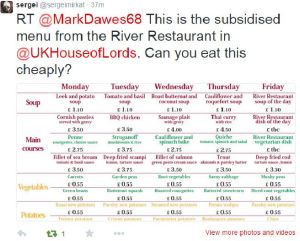 Foodbanks for the UK’s poor and this subsidised menu for the Lords and Ladies. Click on it to see it larger. As background, we should point out that there are still hereditary peers in the House, and that because the Church of England and the state are not separated, there are also 26 ‘Lords Spiritual’. Most of the rest are appointed by the Monarch on the advice of the Prime Minister of the day. For those who argue that this is acceptable, because the government is chosen by the UK electorate, and the Monarch is unlikely to reject the advice, we point out (1) that MPs are elected on a first-past-the-post basis, which means that many views will never be represented, and (2) all the evidence suggests that elections are won by candidates/parties that spend the most money (listen to Dr Roslyn Fuller’s talk from 36m33s). Plutocracy, not democracy Politicians are therefore, of course, answerable to the big-money interests who donate to their parties (or control the media that can influence their electoral chances) and this will, of course, result in appointments to the House of Lords that reflect such interests. It should therefore come as no surprise that many Lords have huge vested interests in the neoliberal policies being adopted by recent UK governments, such as the creeping privatisation of the NHS and fracking. Of course, the super-rich always want more money, for reasons speculated on above, so it should come as little surprise that Lords make as much use of their lavish expenses allowance as possible, many allegedly turning up at the House of Lords for a few minutes every day to claim their £300 daily expenses. Here’s an interesting comment from Andy Wightman regarding land reform in Scotland:
 Baroness Jenkin criticised the users of foodbanks but sits on a committee that approved a £65,000/year champagne budget for the House of Lords. Perhaps nothing illustrates the out-of-touchness of the Lords better than their recent decision, at a time when austerity is really biting for many Britons, not to cut their lavish champagne budget. Need we say more? |
|
| The top and bottom of the box: inequality | |
  |
|
| Neoliberalism widens inequality, and this is bad for everyoneThis section gets to the heart of neoliberalism, the economic dogma adhered to by all the main UK political parties. The fact is that neoliberalism widens inequality (and so does the monetary system), and this has bad consequences for everyone. (Here is what has happened with regard to inequality in the UK, and here is what has happened in the USA.) As set out below, the evidence is overwhelming, so the super-rich cannot credibly deny that they do not know this.
Inequality, caused by neoliberalism, even damages economic growth Neoliberal policies are explicitly supposed to promote economic growth (remember the ‘rising tide lifts all boats‘ metaphor). The OECD has reported that income inequality hampers economic growth, while the redistribution of wealth and taxes doesn’t. Inequality kills The graph below, modified from one that appears on the Equality Trust website, summarises the effects of inequality on society. Note the relative position of the UK. Note the effect on life expectancy and see Michael Marmot’s classic Whitehall Studies for further information on the fact that one’s socio-economic status and not one’s behaviour (e.g. smoking habits, diet, alcohol consumption) is the most important determinant of longevity. 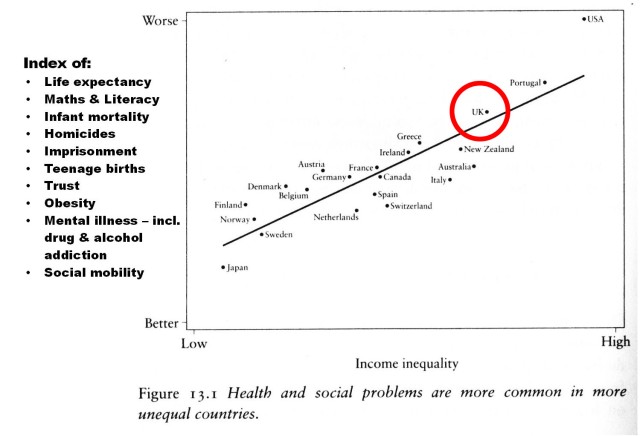 Graph modified from the Equality Trust website showing that health and social problems are worse in unequal countries. Click on the image to visit the site and learn more. Vicious circle Most significant is the fact that social mobility is harmed by inequality. This means that the wider the gap between the rich and poor the harder it is for the poor to ‘better themselves’. In effect, they are caught in a widening poverty trap, for which there are many reasons, including the facts that the rich can get away with paying relatively little tax, they can get discounts for buying in bulk, they earn income on property (both through rent and through subsidies, and we even subsidise their grouse-shooting), they earn interest on their money, and the fact that their wealth gives them the political clout to influence government policy (law), which is why we have the situation we do in the first place. Other factors are that inequality damages people’s ability to trust each other, and wealth appears to damage people’s ability to empathise, the wealthy almost inevitably feeling a sense of entitlement. Adding all this up means that there is a vicious circle in operation here: the more unequal society becomes, the more unlikely it is for the wealthy to want to fix it. Indeed, their callousness and sense of entitlement must certainly contribute to their concerted attempts to scapegoat and demonise the poorest and least empowered, a phenomenon witnessed in much of the mainstream media and in the attitudes of many of the successfully propagandised, who call in to talk radio shows etc., attacking the people at the bottom when their focus should be on the crooks at the top. Here’s a humorous article on such demonisation in the USA. Does it ring any bells? |
|
| In conclusion | |
We hope you have enjoyed your Con Flakes, and found them digestible. Please note that it can only help your health, and that of others, if you take some action. In time, we shall be producing a long list of suggested actions, but for now we suggest that you might like to do at least one of these:
Thank you. We shall overcome! |
|









